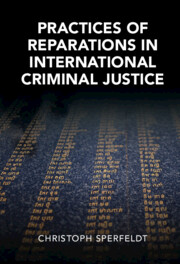Book contents
- Practices of Reparations in International Criminal Justice
- Cambridge Studies in Law and Society
- Practices of Reparations in International Criminal Justice
- Copyright page
- Contents
- Figures
- Tables
- Preface
- Acknowledgements
- Introduction
- Background to the Two Case Studies
- Part I Norm-Making
- Part II Engaging Survivors
- 3 Targeting, Participating and Representing
- 4 Communicating and Consulting
- 5 Assisting
- Part III Adjudicating
- Part IV Implementing
- Bibliography
- Index
- Cambridge Studies in Law and Society
3 - Targeting, Participating and Representing
from Part II - Engaging Survivors
Published online by Cambridge University Press: 23 June 2022
- Practices of Reparations in International Criminal Justice
- Cambridge Studies in Law and Society
- Practices of Reparations in International Criminal Justice
- Copyright page
- Contents
- Figures
- Tables
- Preface
- Acknowledgements
- Introduction
- Background to the Two Case Studies
- Part I Norm-Making
- Part II Engaging Survivors
- 3 Targeting, Participating and Representing
- 4 Communicating and Consulting
- 5 Assisting
- Part III Adjudicating
- Part IV Implementing
- Bibliography
- Index
- Cambridge Studies in Law and Society
Summary
Reparations have forced international(-ised) criminal courts to move beyond their comfort zones and engage with the diverse socio-political and cultural contexts before them. At the core of this process is the courts’ engagement with survivors of mass atrocities, who were largely absent during the negotiations. The first cases before both the ICC and the ECCC were the testing ground for their novel victim participation schemes. This chapter shows that targeting and representational practices have shaped participation, influencing who receives reparations and how these reparations are conceived. The contours of the groups of victims who receive reparations are constructed and continuously contested through practices of juridification and litigation. Moreover, ‘participation’ is carried out through representatives who translate and discipline the multitude of survivor demands for the purposes of courts’ legal proceedings. This chapter focuses on the two groups most involved in such ‘reparational’ practices: NGO ‘intermediaries’, and victims’ legal representatives.
Keywords
- Type
- Chapter
- Information
- Practices of Reparations in International Criminal Justice , pp. 81 - 112Publisher: Cambridge University PressPrint publication year: 2022

